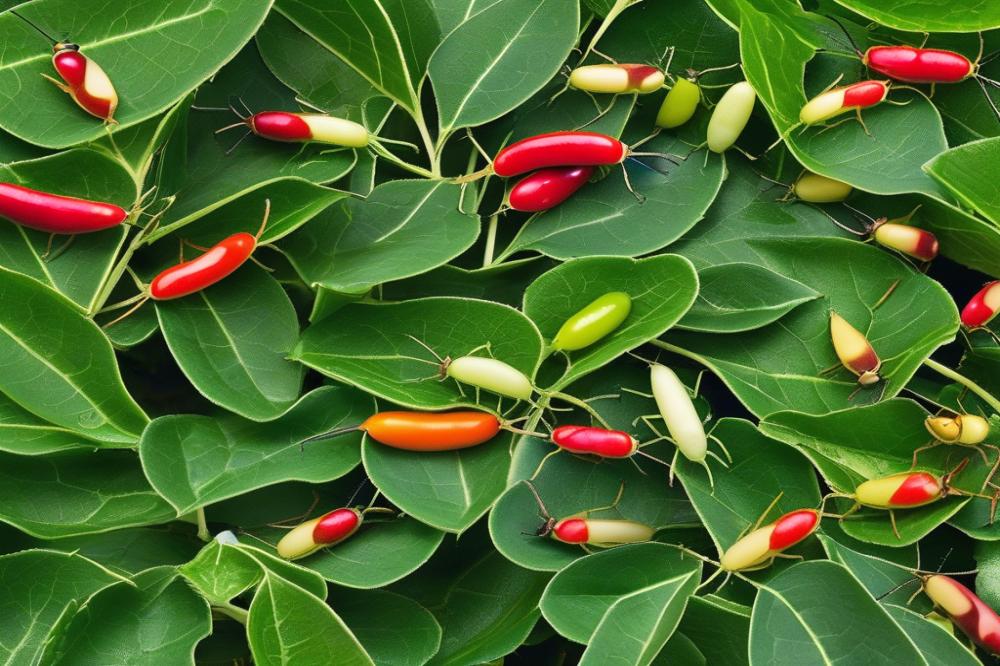Importance of organic pest control for bean plants
Maintaining a healthy garden ecosystem is crucial, especially when cultivating bean plants. These crops offer not only delicious and nutritious food but also enrich the soil. However, they face various challenges, particularly from pests that can quickly damage or destroy them. This is where organic pest control comes into play.
Many gardeners prefer non-toxic solutions to protect their crops. Chemical pesticides can harm beneficial insects and disrupt the delicate balance of the ecosystem. natural pesticides, such as neem oil and insecticidal soap, provide effective alternatives without the harsh effects of synthetic chemicals. Techniques like companion planting can also help deter unwanted pests by attracting beneficial insects that prey on common threats.
Gardeners often encounter issues with pests like aphids, beetles, and caterpillars. These creatures can reduce yields and compromise the overall health of plants. Effective pest prevention strategies are essential. For instance, diatomaceous earth can be sprinkled on the soil to create a barrier against soft-bodied pests. Additionally, homemade remedies such as garlic spray can serve as a potent deterrent.
Crop rotation is another method to protect bean plants. Changing the planting location each year disrupts pest life cycles and can decrease infestations. Embracing practices like these fosters a vibrant garden where plants thrive.
Incorporating organic gardening principles not only safeguards bean plants but also enhances biodiversity. With a little knowledge and effort, gardeners can cultivate their beans while keeping their ecosystems healthy and thriving.
Understanding Common Pests


Bean plants can face a variety of challenges from pests. Among these, aphids are quite notorious. These tiny insects suck the sap from leaves, causing wilting and stunted growth. If left unchecked, they can quickly multiply and damage entire crops. Observing your plants regularly can help you spot them early.
Another common threat is the beetle. These pests often chew on the leaves, leaving behind small holes that can weaken the plant. Two types of beetles are particularly troublesome: the Mexican bean beetle and the bean leaf beetle. Prevention is essential, as these beetles can destroy a healthy plant in just a few days.
Caterpillars also pose a significant risk. They munch on leaves voraciously and can completely defoliate a plant in a short amount of time. Identifying these pests in their early stages, often as small larvae, can prevent larger problems down the line.
Understanding the specific damage caused by these pests is crucial. Early identification allows for quicker intervention, which can save your plants. Utilizing natural pesticides can keep pests away without harming other beneficial organisms. Tools like neem oil and diatomaceous earth have shown good results for organic gardening.
Companion planting is another great method for pest control. Pairing beans with plants that deter pests can create a natural barrier. Additionally, attracting beneficial insects can form a natural defense for your garden. Ladybugs and lacewings, for instance, feast on aphids, helping protect your bean crops.
Crop rotation serves as an effective strategy too. Changing the location of your bean plants each season can disrupt the life cycle of persistent pests. Regular rotations reduce the risk of infestations significantly, keeping your yields healthy.
Garlic spray is a simple yet effective solution. Its scent deters many pests and provides a strong layer of protection. Meanwhile, insecticidal soap can target soft-bodied insects like aphids while being gentle on the beans.
Overall, consistently monitoring and employing various pest prevention strategies is vital for your beans. Taking early action can make a significant difference in the health and productivity of your garden.
Natural Pesticides for Bean Plants


When it comes to protecting bean plants from pests, using natural pesticides can be a practical solution. Many gardeners appreciate these eco-friendly options. They help control pests without harming the environment. Here are some effective natural pesticides you can consider.
Neem Oil
One popular choice is neem oil. This oil comes from the seeds of the neem tree and has been used for centuries. It acts as a repellent and disrupts the life cycle of many insects. For example, aphids and spider mites can be significantly reduced with this method. To apply neem oil, mix it with water according to the label instructions. Use a spray bottle for even coverage on leaves and stems. Be cautious and spray during cooler parts of the day to avoid leaf burn.
Diatomaceous Earth
Diatomaceous earth is another effective option. This non-toxic powder is made from fossilized algae. It works by causing microscopic damage to the exoskeleton of insects. This disruption leads to dehydration and death for pests like slugs and beetles. Simply sprinkle a thin layer around the base of your bean plants. Reapply after rain or watering to maintain its efficacy.
Insecticidal Soap
Insecticidal soap is a useful tool in organic gardening. It’s made from natural plant oils and fats. This soap kills pests on contact by suffocating them. This method is effective against soft-bodied insects such as aphids and whiteflies. Mix the soap with water as per product instructions. Then, spray it directly onto affected areas of your plants. It’s important to avoid using it during hot and sunny weather, as it can cause damage to the leaves.
Garlic Spray
Garlic spray serves as a strong deterrent for many insects. It contains sulfur compounds that pests find unpleasant. To make this spray, blend garlic cloves with water and strain it. Mix in a few drops of liquid soap to help it adhere to plant surfaces. Spray this mixture on your bean plants, focusing on the undersides of leaves. Using it weekly can help control infestations.
Pest prevention is crucial in maintaining healthy crops. In addition to these natural pesticides, practices like companion planting and crop rotation can be beneficial. Planting beans alongside certain flowers can attract helpful insects. Also, rotating crops can prevent pests from establishing themselves. Incorporating these methods into your gardening routine can lead to better outcomes without harmful chemicals.
Companion Planting Strategies


Companion planting is a method that gardeners use to enhance their crop yields and protect plants naturally. This technique involves growing specific plants together to benefit each other. Certain plants can repel pests, while others attract beneficial insects that prey on harmful pests.
For example, marigolds are popular companions for bean plants. Their strong scent deters aphids and other insects that might harm your beans. Moreover, planting garlic near beans can help too. It has natural properties that repel many pests. You can create rows of beans interspersed with garlic or marigolds for a more effective layout.
Besides marigolds and garlic, consider planting basil alongside your beans. Basil not only enhances the flavor of the beans but also attracts bees and other pollinators, which can improve bean production. Another useful companion is corn. When planted nearby, corn can provide shade and support for climbing bean varieties. Utilize this strategy to maximize your garden space.
Integrating beneficial plants is key to pest prevention. Look into flowers like nasturtiums, which draw aphids away from your beans, acting as a trap crop. They can serve as a distraction, protecting your primary plants from damage.
Crop rotation is another method to maintain soil health and reduce pest build-up. Avoid planting beans in the same spot every year. Rotate with crops like radishes or carrots to disrupt pest cycles. This practice not only benefits your beans but enriches your garden soil.
When pests do arrive, organic gardening methods can help keep them in check. You can use neem oil or insecticidal soap for targeted applications on affected plants. These natural pesticides are effective and safe for the environment. Additionally, diatomaceous earth is a great option. It’s a powder that can be sprinkled around your plants to deter crawling pests.
Garlic spray made from blended garlic cloves can also fend off unwanted visitors. Just mix water and crushed garlic, let it steep, and spray it on the plants. It’s a simple way to keep them safe without chemicals.
By using companion planting, gardeners can create a balanced ecosystem. Each companion plant plays a vital role in maintaining the health of bean plants. With some planning, your garden can thrive naturally, embracing the principles of organic pest control.
Beneficial Insects in the Garden


In the realm of organic pest control, beneficial insects serve as silent guardians. These tiny allies help manage pests that threaten your bean plants. Ladybugs, for instance, are well-known for their appetite for aphids. A single ladybug can consume thousands of aphids in its lifetime. Lacewings also play a crucial role by feeding on various harmful insects like mealybugs and spider mites. Attracting these creatures can significantly boost your garden’s health.
Creating a welcoming environment for beneficial insects does not require a lot of effort. Start by incorporating companion planting. This technique involves growing specific plants together to enhance growth and deter pests. Adding flowers like marigolds or dill can draw in ladybugs and lacewings. A diverse garden with a variety of plants provides food sources and habitats for these helpful insects.
Using natural pesticides can deter unwanted pests while preserving the beneficial ones. Products like neem oil and insecticidal soap are effective without being harmful to friendly insects. Spraying garlic spray can also repel pests while still allowing beneficial insects to thrive. In contrast, diatomaceous earth can kill soft-bodied insects without affecting hard shell insects like ladybugs.
Pest prevention should always be a top priority. Crop rotation is another effective strategy. Changing the location of bean plants each season reduces the risk of pest infestations. This practice interrupts the life cycles of pests that may have settled in one spot. By continuously shifting where you plant, you hinder their chances of returning.
Finally, remember that patience is vital in organic gardening. It may take time for beneficial insects to find and settle in your garden. By implementing these strategies, your bean plants will have a stronger defense against harmful pests. Support their presence, and they will help protect your plants naturally.
Pest Prevention Techniques
Pest prevention is crucial for healthy bean plants. Start by practicing crop rotation. Changing the location of your beans each season disrupts pest life cycles. This simple method can significantly reduce infestations over time.
Another effective strategy is proper spacing. When planting your beans, give each seedling enough room to grow. Good air circulation lowers the risk of pests and diseases. It allows plants to thrive and develop strong defenses.
Maintaining plant health is also vital. Healthy plants can naturally resist pests better. To promote vitality, feed your beans with organic fertilizers regularly. Additionally, don’t forget to keep the soil well-drained and enriched.
Regular monitoring for signs of pest activity helps gardeners stay proactive. Check your plants often for any unusual spots or damage. This simple step allows for quick action before a larger infestation takes hold.
Companion planting works well too. Pairing your beans with repellent plants, like marigolds, naturally deters harmful insects. This clever technique also enhances growth through beneficial relationships between plants.
Incorporating beneficial insects into your garden can be a game changer. Predators like ladybugs and lacewings feast on pests. They can significantly reduce aphid and mite populations without the need for harsh chemicals.
When pests do appear, consider natural pesticides. Neem oil is a popular choice. This oil disrupts pest growth and makes it harder for them to feed. Diatomaceous earth is another great option. It’s safe for your plants and damages insect exoskeletons, leading to their demise.
Using insecticidal soap is an effective way to control soft-bodied insects. Spraying a targeted area will clear away unwanted visitors quickly. Additionally, you can make your own garlic spray. The strong smell acts as a deterring force, keeping many pests at bay.
Always be prepared to take proactive measures. Apply barriers or traps if necessary to safeguard your plants. By using these techniques, you’ll strengthen your bean plants against pests.
Final Thoughts on Bean Plant Protection
The significance of using organic pest control methods for bean plants cannot be overstated. These strategies not only help protect your crops but also promote a healthier environment. Pest issues can devastate a harvest, leaving gardeners frustrated and upset. However, by implementing natural solutions, you can minimize damage while fostering a thriving garden ecosystem.
Adopting these techniques can support the growth of robust bean plants. Employing practices such as companion planting can deter harmful pests. Moreover, utilizing natural pesticides offers a safe alternative to chemical treatments. It’s important to remember that healthy plants attract beneficial insects, which can provide further protection.
Bean cultivation can be a rewarding experience when done correctly. By focusing on organic methods, you also contribute to a larger movement that values sustainable gardening practices. Every small step counts. Embrace these tips to achieve a hearty harvest while supporting the earth’s well-being. Encouragement towards these approaches will not only serve you well but will benefit our planet as a whole. So, why not give them a try? Your beans—and the environment—will thank you.



